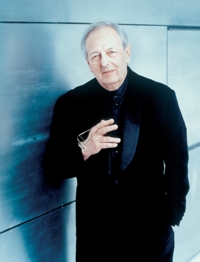
 André Previn's new Sonata for Clarinet and Piano, commissioned by Thomas Martin, Associate Principal clarinetist of the Boston Symphony Orchestra, and premiered at the Prague Spring International Music Festival, is a work that further emboldens Previn's stature as composer in love with shrewd sonorities, enraptured by sharp rhythmic interplay, and enamored with insightful, beautiful melodies.
André Previn's new Sonata for Clarinet and Piano, commissioned by Thomas Martin, Associate Principal clarinetist of the Boston Symphony Orchestra, and premiered at the Prague Spring International Music Festival, is a work that further emboldens Previn's stature as composer in love with shrewd sonorities, enraptured by sharp rhythmic interplay, and enamored with insightful, beautiful melodies.
In these three movements (with an interlude between the second and third) Previn draws from his profound musical mind to compose a playful work that masterfully contrasts the two dynamically different instruments. Here, the clarinet dances, often in tonal juxtaposition, above the polytonal piano accompaniment, whose rhythmic material provides yet another layer of counterpoint to the brisk and lively melodic lines of the clarinet. Asked about his penchant for such juxtapositions, Previn referenced a quote from a fellow composer: "My friend John Harbison, whom I admire boundlessly as a composer, said: 'André, you have a wonderful habit where you write something that is actually quite dissonant, but sooner or later it blossoms into a completely pure triad...' " to which Previn self-consciously replied: "the only reason I do that is I can't think of anything else at the time!"
The humility Previn reflects is a window into his humble personality and, of course, it is a glimpse into his beautifully balanced compositions. In this work for clarinet and piano, Previn breaks from a traditional sonata form — fast-slow-fast — to include an interlude, where, as Previn states, "the clarinet never plays anything but the same bars over and over and over — only the accompaniment changes. I have no idea what that's going to sound like, but Thomas Martin loves it!" Here, too, Previn reveals another aspect of his success: his personal connection to the performers of his works. In this sonata, his admiration for the clarinetist serves not only as an impetus for its composition, but for the dynamic personality evident in the music itself.

